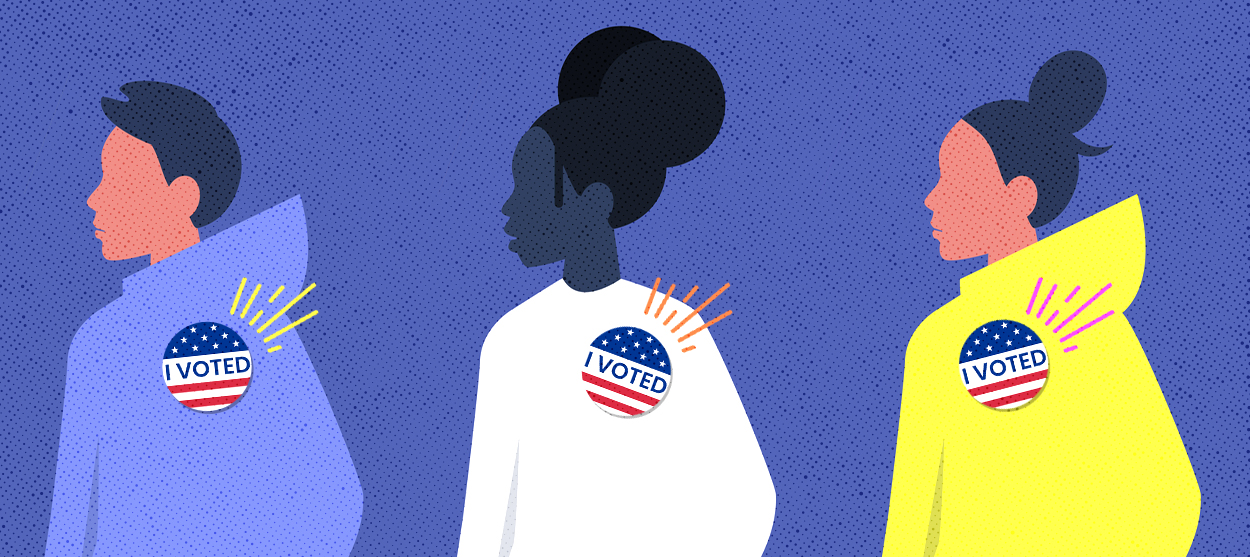The week's best parenting advice: September 29, 2020
How to talk to teens about voting, what COVID means for pregnant women, and more


A free daily email with the biggest news stories of the day – and the best features from TheWeek.com
You are now subscribed
Your newsletter sign-up was successful
1. Talking to teens about voting
Teenagers have a lot on their minds: friends, school, graduating, college, jobs. Casting a ballot in the 2020 presidential election might be low on their list of priorities. Indeed, many young people seem to stay home on election day: In 2016, just 46.1 percent of 18 to 29 year olds voted, per data from the U.S. Census Bureau. How can parents raise politically engaged children? Start talking about politics long before they turn 18, suggests Brooke Ackerly, professor of political science at Vanderbilt University. "This prepares them for being citizens and for taking up the responsibilities, rights, and freedoms that we have in a democracy." Make the conversation relevant to their lives by asking about things like school leadership and rules. Who decides the rules? Are the good rules? Do they work? And don't try to change their political opinions. "You want them to be able to think for themselves," Ackerly says. Help them find information online about casting a ballot: Vote.org can be a big help.
2. Pregnant during a pandemic
How does COVID-19 affect pregnant women? New research is providing some answers to this question, and the findings "should be somewhat reassuring," gynecologist Denise Jamieson tells NPR's All Things Considered. While it does seem the virus can sometimes cross into the placenta, "there isn't evidence that when this happens there is an association with birth defects the way we found with viruses like Zika," Jamieson says. However, as University of Oregon's Jennifer Ablow and Oregon Health and Science university's Elinor Sullivan note at The Conversation, "the long-term influence of the virus on the developing child is not yet known." Still, the obvious risk to anyone pregnant, they think, is pandemic-induced stress. Anxiety and stress has been linked to all kinds of problems in pregnancy, including low birth weight. "To make stress tolerable," they write, "adequate social support, access to supportive resources, and economic stability are necessary."
The Week
Escape your echo chamber. Get the facts behind the news, plus analysis from multiple perspectives.

Sign up for The Week's Free Newsletters
From our morning news briefing to a weekly Good News Newsletter, get the best of The Week delivered directly to your inbox.
From our morning news briefing to a weekly Good News Newsletter, get the best of The Week delivered directly to your inbox.
3. How to pack a 'go bag' for your family
Wildfires continue to rage on the West Coast, but even if you're nowhere near the danger zone, the emergency — and the ongoing evacuations — present a good opportunity to consider packing a go bag. After all, "there may be other disasters that require you to leave with just a moment's notice," writes A.C. Shilton at The New York Times. Parents should make sure everyone in the family has their own bag. "If you get separated, you'll want to know that your kid's medicine is with your kid, not jammed in the bottom of your bag," Shilton says. Along with meds, pack clothes, shelf-stable food and water, and a basic first-aid kit. Important paperwork should go in a waterproof folder. Are you going to a shelter? A family member's? A hotel? Talk about it with your family and write it all down, then put a copy of the plan in each family member's bag.
4. Move over, Peloton
One concern for parents who have opted for virtual learning is that their kids are spending all day staring at screens and very little time moving their bodies. One ingenious solution comes from parent Julie Bredemeier Fulks, who swapped her kindergartener's chair for a DIY stationary bicycle. The homemade exercise bike is just her kid's bike, complete with training wheels, propped up on a pair of shoes so that the back wheel can spin freely. "The movement helped SO much!!!" Fulks says in a Facebook post. If you've got hardwood floors, protect them by putting a yoga mat under the bike, suggests Meghan Moravcik Walbert at Lifehacker. "Test it out first, slow and steady, before you let them pedal their way through math class."
A free daily email with the biggest news stories of the day – and the best features from TheWeek.com
Julie Bredemeier Fulks Lifehacker
5. The new Halloween traditions
Halloween 2020 is going to be a little bit different, thanks to the pandemic. The Centers for Disease Control and Prevention recommends against "traditional" trick-or-treating, as well as haunted houses and costume parties. But there are other ways for kids to celebrate: Apple picking, pumpkin patches, and socially distanced outdoor scary movie nights are nice options, NPR's Laurel Wamsley says. Or try a scavenger hunt. Entertainment expert Melissa Johnson at Best Friends for Frosting suggests repurposing some orange plastic Easter eggs for a "pumpkin" egg hunt. "Put candy in your eggs, and then hide the eggs all throughout the house or even the backyard. Have the kids dress up in fun Halloween themed pajamas to get the party started." Happy hunting!
Jessica Hullinger is a writer and former deputy editor of The Week Digital. Originally from the American Midwest, she completed a degree in journalism at Indiana University Bloomington before relocating to New York City, where she pursued a career in media. After joining The Week as an intern in 2010, she served as the title’s audience development manager, senior editor and deputy editor, as well as a regular guest on “The Week Unwrapped” podcast. Her writing has featured in other publications including Popular Science, Fast Company, Fortune, and Self magazine, and she loves covering science and climate-related issues.
